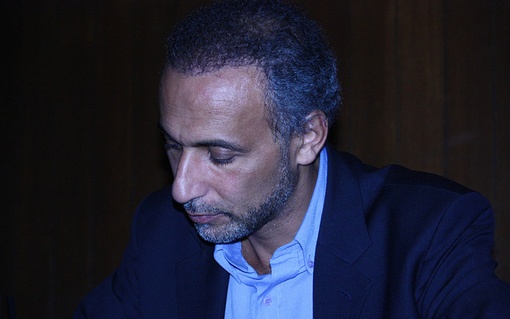
Photo by srizki | CC BY 2.0
Harvey Weinstein isn’t in jail; neither is actor Kevin Spacey, chef Mario Batali, TV host Matt Lauer, nor New York attorney general Eric Schneiderman. Although some might like to see them behind bars. Even convicted felon Bill Cosby is free until he’s sentenced in September.
(Being out of jail does not of course imply any of those accused are innocent. Their temporary respite could be related to the degree of their misconduct, the status of investigations underway, or the efforts of highly paid attorneys.)
As the extent of widespread abuse of women came to light, I too could not help but recoil with anger. Then, sobering and remembering an unvoiced childhood experience, I signed #MeToo.
When Tariq Ramadan’s name was added to the growing list of “MeToo” culprits, my response was distress similar to sorrow I felt learning about other ‘outed’ misogynists whose work I had admired.
There’s a further worrying dimension to Ramadan’s alleged sexual misconduct, namely, his disrepute would be a blow to Muslims’ already uphill struggle to articulate the meanings and experiences of Islam to the public, a universal community needing to hear an eminently qualified and soft-intellectual voice in the debate, such as Ramadan’s was. (Never enthusiastic about Ramadan, I viewed him as an apologist at times. I also found his critiques of institutional Islamophobia and biased media too mild—maybe that’s the academic in him. So Ramadan may have been imperfect at many levels. But his calm style and his erudition are as needed as that of the regrettably few articulate Muslim leaders we have, including the irrepressible and savvy activist Linda Sarsour.
The urgency with which Ramadan’s case be reexamined came to my attention four months ago in Alain Gabon’s lengthy account of the charges against Ramadan and the history of assaults on him by French leaders. .I learned that Ramadan was in preventative detention in a Paris prison, held in solitary, denied medical treatment and contact with his wife (a French citizen; Ramadan himself is Swiss, of Egyptian-Arab origin).
Ramadan, without legal indictment or trial, was summarily jailed soon after the allegations surfaced. According to reports, he voluntarily traveled to Paris to answer the charges, only to find himself immediately detained, placed in solitary confinement without medication for a serious neurological illness. He remains imprisoned, subjected to unusually harsh conditions during these past six months.
Tariq Ramadan is not only an Oxford University professor and highly respected author. He is a regular media commentator on Islam and Muslim affairs. Most who know his work were shocked learning he was accused by two French women of a serious sexual offence—rape. He’s one of a three Muslim leaders who faced accusations of sexual misconduct; of the other two—both Americans, and both exposed before 2017—one was eventually convicted, the second banished by the community, according to a US publication, which then uses these cases to explore ‘personality worship’ in Islam! What about personality worship in America?)
The American press ceased following Ramadan’s case after accusations surfaced. And the American Muslim community has been shamefully absent on the issue. Shameful because there is reason to believe Ramadan’s treatment is unjust (if not illegal), and because those organizations claim a human rights agenda. Although Ramadan was a featured guest at Islamic and other religion-related conferences, and his books are popular, the American Muslim community of mosques and Islamic organizations have remained silent since his arrest.
Details of the case are well known, as documented in several lengthy articles, including that cited above. They report that there’s clear evidence that one enamored accuser had harassed and stalked him for years. Of the other’s charge, he maintains he was not in the city of the alleged assault. This accuser is said to be an associate of a well known French feminist with a long record of anti-Islamic behavior.
These arguments do not posit that Tariq Ramadan is innocent. What concerns people familiar with Ramadan’s work in France are: first, a long history of attacks against him as a Muslim spokesperson by (mainly Socialist) political headers who include former President Sarkozy and Prime Minister Valls. Ramadan’s current case seems further prejudiced by its transfer to the office of Paris prosecutor Francois Molins who is concerned with cases of Islamic terrorism.Second, defenders question why Ramadan has been singled out for imprisonment when French film director Luc Besson and state ministers Darmanin and Hulot, all included in the list of accused rapists in the wake of #MeToo, have not been jailed. Thirdly, there’s outrage over the severe conditions of Ramadan’s detention.
With more is learned about Ramadan’s prison conditions, and the credibility of his accusers is challenged, arguments in his defense are garnering attention, mainly in Europe; and a campaign on his behalf is now underway. Besides the worldwide appeal, and more than 151,000 signatories (to date) on the www.change.org petition, hundreds of scholars have recently signed a due process appeal.
This month, New Trend, the online newsletter, published by Jamaat Al-Muslimeen (06/10/18, #1762) called for inquires into Ramadan’s status. There, The Muslim Association of Britain publicly expressed its shock “to see that even the most basic rules of justice being flagrantly ignored by the French authorities”.
For the present, a French court agreed that Tariq Ramadan’s wife may now visit him. Let’s see what further appeals produce.